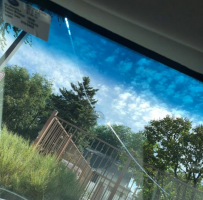— A Subaru windshield lawsuit has been partly dismissed after a federal judge ruled several claims made by Subaru owners weren't sufficiently pleaded.
According to the Subaru windshield lawsuit, these models were equipped with front glass prone to chip, crack and break.
- 2017-2020 Subaru Forester
- 2017-2020 Subaru Outback
- 2017-2020 Subaru Crosstrek
- 2017-2020 Subaru Legacy
- 2017-2020 Subaru Impreza
The windshield lawsuit was filed in October 2019 and amended in November 2019. Then the class action lawsuit was consolidated with three other lawsuits, then another lawsuit was added in April 2020.
A California plaintiff purchased a used 2017 Subaru Outback in 2019, but a small pebble allegedly hit the windshield and caused a small chip in the glass. The chip turned into a T-shaped crack over the next five weeks and cost the owner $490 for repairs.
A Wisconsin plaintiff says she purchased a new 2018 Subaru Forester in 2017, but in December 2017 the windshield cracked for no apparent reason. The plaintiff took her Subaru to a dealership where the windshield was replaced and paid for by the plaintiff and her insurance company.
The Subaru replacement windshield allegedly broke for no apparent reason in May 2019 when the vehicle had 15,000 miles on the odometer. However, the plaintiff says she lives several hours from a Subaru dealership and hesitates to spend more money on the windshield.
Motion to Dismiss the Subaru Windshield Lawsuit
In a motion to dismiss, Subaru argues the plaintiffs lack standing to bring claims related to multiple Subaru models because “no Plaintiff has ever owned a Legacy of any model year; a 2017 Crosstrek or Impreza; any 2019 Impreza; or any 2020 Crosstrek, Forester, or Impreza.”
The judge says courts have ruled in various ways, some which found dismissal appropriate, and some which found dismissal for standing to be premature at this stage. In this windshield case, the judge found dismissal at this stage would be premature.
However, three plaintiffs saw their express and implied warranty claims dismissed.
And all express warranty claims are dismissed as to Subaru Corporation, but the judge says he declines to dismiss implied warranty claims against Subaru at this stage in this litigation.
Although all express warranty claims are dismissed as to Subaru Corporation, Subaru argues all express warranty claims fail as a matter of law because the new vehicle limited warranty explicitly covers defects in material or workmanship, but not design defects.
In its motion to dismiss, the automaker says the plaintiffs try to allege the windshields are defectively designed or manufactured. According to Subaru, vehicle owners "lack any factual allegations relating to a manufacturing defect."
The Subaru windshield lawsuit alleges three potential causes of why the windshields may crack, chip or break. First is the alleged combination of ceramic materials for the black-colored printed perimeter with silver-colored material used for the wiper deicer portion of the windshield.
Second, the windshields allegedly chip and crack because Subaru used “acoustic glass” for the windshields. And finally, the class action alleges problems are caused by the thickness of the windshield glass.
Subaru argues those potential causes are design-related decisions that involve no failure to manufacture the windshields correctly. And design problems aren't covered by the warranty.
However, the judge says just because the allegations could involve design defects, it's not enough to defeat claims at the motion to dismiss stage.
But five breach of express warranty claims must be dismissed because five plaintiffs don't allege they presented their vehicles to Subaru for windshield repairs. Subaru says the new vehicle limited warranty “require[s] that the vehicle be presented to an authorized Subaru retailer for warranty repairs.”
In addition to those dismissals, the judge dismissed implied warranty claims made by two plaintiffs because those Subaru owners weren't in "strict vertical privity" with Subaru.
According to the judge, all Magnuson-Moss Warranty Act claims are dismissed because jurisdictional requirements demand 100 named plaintiffs be listed on a class action and the number of named plaintiffs on the Subaru class action is far below 100.
According to the judge, the plaintiffs, at this stage, sufficiently plead fraudulent omissions, but the judge did dismiss a claim under the Song-Beverly Act from one plaintiff.
The Subaru windshield lawsuit was filed in the U.S. District Court for the District of New Jersey - Powell, et al., v. Subaru of America, Inc.
The plaintiffs are represented by Carlson Lynch, LeVan Law Group, Moon Law APC, and Freed Kanner London & Millen.
CarComplaints.com has complaints about the Subaru vehicles named in the windshield lawsuit.

